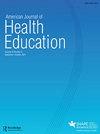The Feasibility and Impact of a Computer-Aided Genetics Education Module in an Obstetrics Clinic: A Randomized Controlled Trial
IF 0.8
Q4 PUBLIC, ENVIRONMENTAL & OCCUPATIONAL HEALTH
引用次数: 0
Abstract
ABSTRACT Background Rapid advances in prenatal genetic testing highlight the need for technology-based tools to assist in informed decision-making. Purpose This study evaluates the feasibility, acceptability, and efficacy of a Computer-Aided Genetics Education Module (CAGEM) as an e-counseling tool and decision aid in a busy obstetric clinic among a socially disadvantaged patient population. Methods A randomized controlled trial with patients randomized (1:1) to receive the intervention in addition to standard of care or standard of care only. Participants responded to pre- and posttest questionnaires. Results Although limited in recruitment by the COVID-19 pandemic, this tool scored 81.0% acceptability and 91.0% feasibility among 88 participants. No statistically significant difference was detected between the overall improvement in knowledge scores and the total posttest knowledge scores among the intervention and control groups. However, the intervention group scored significantly higher on the posttest questions regarding NIPT interpretation (61.7 ± 49.1 vs 80.9 ± 39.8, p = .049), Down syndrome (78.7 ± 41.4 vs 93.6 ± 24.7, p = .016), and inheritance of recessive conditions (59.6 ± 49.6 vs 91.4 ± 28.2, p < .001). The intervention group also showed a greater improvement in knowledge scores for inheritance of recessive conditions (31.9 ± 8.1 vs 0 ± 7.8, p = .006) and a protective effect in knowledge scores for Down syndrome (0 ± 6.1 vs −17.1 ± 6.0, p =.049). Discussion CAGEM may be a feasible and acceptable e-counseling tool and decision aid, especially when compared to standard of care prenatal counseling. Although overall knowledge did not show significant improvement, CAGEM showed promise in enhancing knowledge acquisition for certain genetic education topics, showing that technology-based tools may be beneficial in informed consent. Future iterations may be revised to improve clarity, especially around invasive testing methods, race congruency, and insurance coverage. Translation to Health Education Practice: This study’s method creates a model for Health Educators to design and evaluate technology-based tools for improving informed decision-making around prenatal genetic testing. Tools like CAGEM may be utilized to improve patient education prior to prenatal appointments and thus serve as an adjunct to provider counseling. Specifically, CAGEM addresses multiple NCHEC Responsibilities and Competencies including #1.1.2, 1.3.2, 1.3.4, 4.2.9, and 6.4.3.计算机辅助遗传学教育模块在产科临床应用的可行性及影响:一项随机对照试验
摘要背景产前基因检测的快速发展凸显了对基于技术的工具的需求,以帮助做出知情决策。目的本研究评估了计算机辅助遗传学教育模块(CAGEM)作为一种电子咨询工具和决策辅助工具在繁忙的产科诊所中对社会弱势患者群体的可行性、可接受性和有效性。方法一项随机对照试验,患者随机(1:1)接受除标准护理外的干预或仅接受标准护理。参与者回答了测试前和测试后的问卷。结果尽管新冠肺炎大流行限制了招募,但该工具在88名参与者中获得了81.0%的可接受性和91.0%的可行性。在干预组和对照组之间,知识得分的总体改善与测试后总知识得分之间没有统计学上的显著差异。然而,干预组在NIPT解释(61.7±49.1 vs 80.9±39.8,p=0.049)、唐氏综合征(78.7±41.4 vs 93.6±24.7,p=0.016)、,和隐性遗传(59.6±49.6 vs 91.4±28.2,p<0.001)。干预组还显示隐性遗传知识得分有更大的提高(31.9±8.1 vs 0±7.8,p=.006),唐氏综合征知识得分有保护作用(0±6.1 vs−17.1±6.0,p=.049)工具和决策辅助,尤其是与标准护理产前咨询相比。尽管总体知识没有显示出显著的改善,但CAGEM在加强某些基因教育主题的知识获取方面显示出了希望,表明基于技术的工具可能有利于知情同意。未来的迭代可能会进行修订,以提高清晰度,尤其是在侵入性测试方法、种族一致性和保险范围方面。转化为健康教育实践:这项研究的方法为健康教育工作者创建了一个模型,用于设计和评估基于技术的工具,以改善产前基因检测的知情决策。CAGEM等工具可用于改善产前预约前的患者教育,从而作为提供者咨询的辅助手段。具体而言,CAGEM涉及NCHEC的多项职责和能力,包括1.1.2、1.3.2、1.3.4、4.2.9和6.4.3。
本文章由计算机程序翻译,如有差异,请以英文原文为准。
求助全文
约1分钟内获得全文
求助全文
来源期刊

American Journal of Health Education
PUBLIC, ENVIRONMENTAL & OCCUPATIONAL HEALTH-
CiteScore
1.70
自引率
10.00%
发文量
36
期刊介绍:
AJHE is sponsored by the American Association for Health Education of the American Alliance for Health, Physical Education, Recreation and Dance. The mission of the American Association for Health Education(AAHE) is to advance the profession by serving health educators and others who strive to promote the health of all people through education and other systematic strategies.AAHE addresses the following priorities •Develop and promulgate standards, resources and services regarding health education to professionals and non-professionals •Foster the development of national research priorities in health education and promotion. Provide mechanisms for the translation and interaction between theory, research and practice.
 求助内容:
求助内容: 应助结果提醒方式:
应助结果提醒方式:


